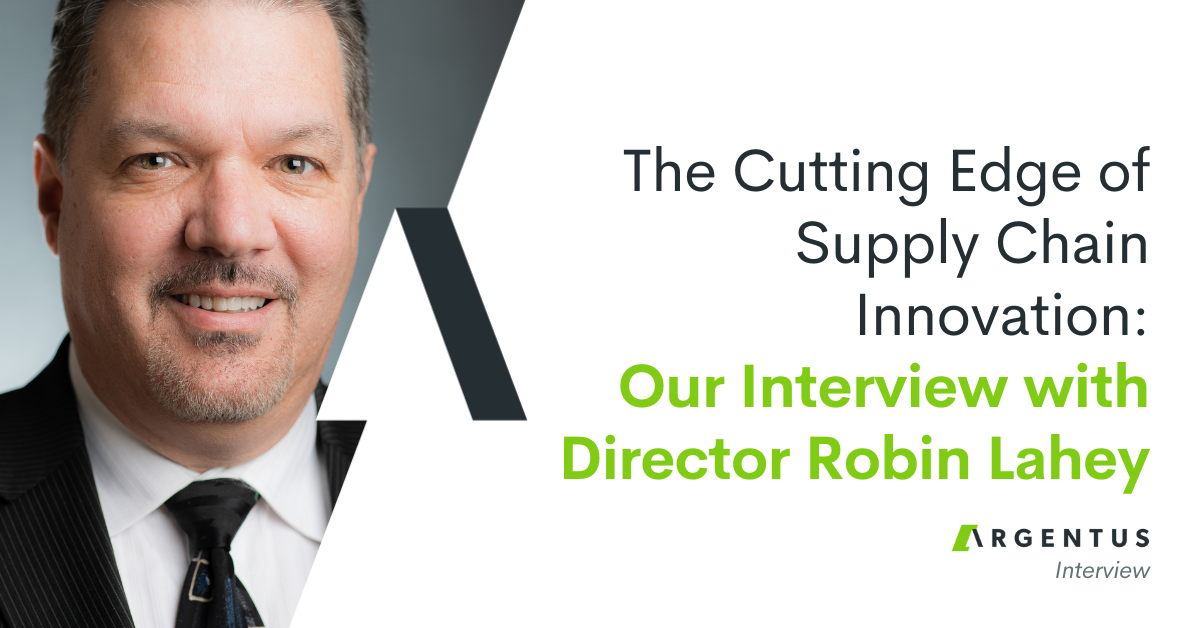
As part of our efforts to stay on top of best practices and developments in our recruiting specialties, we were thrilled with the chance to interview Andrew Leich. Andrew is Assistant Vice President of Strategic Sourcing at Sun Life Financial – one of Canada’s top Financial Services companies, as well as a leader in strategic Procurement.
We asked him about:
- Big-picture trends in terms of how best-in-class companies approach their Procurement function
- The skills companies are looking for
- Common pain points in hiring
- How Strategic Sourcing can better communicate its value
- Whether there’s a talent deficit in Procurement, and what the solution might be.
In other words, many of the big topics that are currently captivating the world of Procurement and Strategic Sourcing.
Check out his answers below!
 Because Argentus is specialized in Supply Chain and Procurement, our readers are very interested in talent issues in these areas – but certainly wider trends are interesting to us as well. Would you be able to talk about two or three big-picture trends or new strategies that you’re seeing emerging in Strategic Sourcing? These can be within the financial services industry or in Strategic Sourcing more broadly.
Because Argentus is specialized in Supply Chain and Procurement, our readers are very interested in talent issues in these areas – but certainly wider trends are interesting to us as well. Would you be able to talk about two or three big-picture trends or new strategies that you’re seeing emerging in Strategic Sourcing? These can be within the financial services industry or in Strategic Sourcing more broadly.
I’ll touch on sustaining/growing our value proposition, it isn’t necessarily a new topic but it is one of a few that is top of mind for me right now. I will stick to this one theme since it is pretty broad.
As a provider of a service to internal clients any discussion regarding value needs to start with what they perceive as valuable. Not too long ago the focus was primarily on generating opportunities and saving money. Don’t get me wrong, these aren’t going away, but overtime as sourcing’s influence expands and categories are sourced, savings start to diminish. Without changing there is a good chance the perceived value will diminish.
Anticipating this a few years ago we decided to align our Sourcing organization to our client’s business and focus on managing each account/relationship rather than spend category. We asked our clients what they valued. It turned out savings was important but only equal to an efficient process, regular communication, providing insights, and having knowledge of their business.
We adjusted our business targets and our performance is now rated on how efficient our process is (we measure average time to close), our client service scores (we ask after each engagement), we talk to our clients about their business in their terms, not “spend’, “categories” and other procurement speak. We report back regularly on performance, opportunities to improve our process (we have brought in a lean management system into Sourcing) and the team escalates issues quickly.
The theme around Sourcing’s value proposition will continue on and we review this annually. Value can be generated in many ways, for us, our efforts to expand beyond savings and connect with our clients on their terms has increased our influence and provided opportunities for growth.
When hiring in Strategic Sourcing and Supply Chain at the entry-level or sole contributor level, what kind of education, work history and working style are you looking for?
In terms of working style and work history I focus on how successful a candidate has been at dealing with ambiguity and how have they successfully shown they can flex and adjust to multiple roles and scenarios. Then I look for strong communication and relationship management skills.
Our role in Sourcing is demanding and challenging in many ways. At various times we are accountable for saving money, providing excellent internal client service, ensuring the appropriate governance is completed, acting in a risk management capacity, and moving fast while managing to a plan.
Successful candidates need to be able to balance these competing, even conflicting, priorities, effectively communicate with the internal client, and create and manage to a sourcing plan.
What are the biggest pain points you’ve encountered when hiring or retaining talent in Strategic Sourcing?
It’s a common challenge but it truly is the biggest one for us, and that’s finding talent. We have had some good success recruiting from outside the procurement/sourcing profession. HR, IT, Real Estate, Finance, etc. You can learn the sourcing skills needed to be successful and the skills mentioned above can be transferred from any number of professions. Making sure our recruiters and networking goes beyond just those related to procurement/sourcing is important to find good talent.
When you’re communicating with people outside the field who might not understand what Strategic Sourcing is, how do you convey the value that it offers to organizations in layman’s terms?
For someone who isn’t familiar with strategic sourcing, I generally lead with our functions role in helping the business avoid cost and reduce expenses. I would explain that we do this by using standard practices like RFPs, managing demand, supplier consolidation, etc.
Along with expenses, we also play a key role helping the business to manage risk – contractual risk, reputational risk, supply chain risk, regulatory requirements and other operational risks.
Sourcing is engaged across the lines of business and across geographies, which makes it easier to uncover opportunities and see the big picture of the business.
Following on the last question: we read a lot about the so-called “Supply Chain talent deficit” – the fact that young people aren’t necessarily getting involved in the field as quickly as the baby boomer generation is retiring. Do you think the Supply Chain and Procurement community needs to do a better job of communicating its value, and / or do you think it needs to become more high-profile in the world of business?
I don’t think there is one answer to this challenge. Certainly maintaining a high profile or increasing the influence of procurement will help. I think the biggest opportunity though is with raising the profile of the profession at the post-secondary level in Canada and attracting top young talent.
Sourcing as a profession offers many benefits. One of the greatest benefits has been the exposure sourcing has to all aspects of the business. Over time you have an opportunity to learn all aspects of the business, engage with business clients and suppliers across the globe.
The nature of the work allows for opportunity to work independently, manage to results, and provides good visibility into how your work supports the overall business strategy. It is an exciting profession, especially looking into the future as the function continues to mature.
A big thank you to Andrew Leich and Sun Life Financial for contributing their insight! ![]()
Have you signed up for Argentus’ Market Watch Newsletter? It only takes a moment. You’ll receive low-volume, high-impact market insights from the top specialty Supply Chain recruiters including: Salary Information, Supply Chain industry trends, Market Intelligence, Personal Branding tips and More!
[mc4wp_form id=”17895″]



About 3 years ago, I had the pleasure to work for Andrew at Sun Life before I moved to Alberta to be closer to family; I can attest to the customer focused approach Andrew and team take toward sourcing and procurement. As a Sourcing Manager I was measured on the traditional savings and spend under management KPIs, but also customer satisfaction, cycle time, and ability to assist our partners to be successful. I really enjoyed the customer focused that balanced savings, compliance, risk management with helping our customers accomplish their objectives. The Sun Life approach worked very well.
Excellent interview!